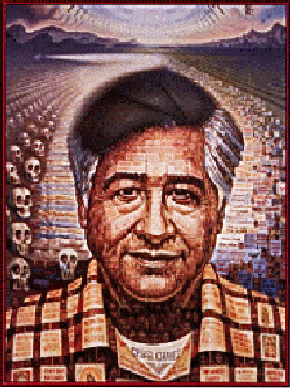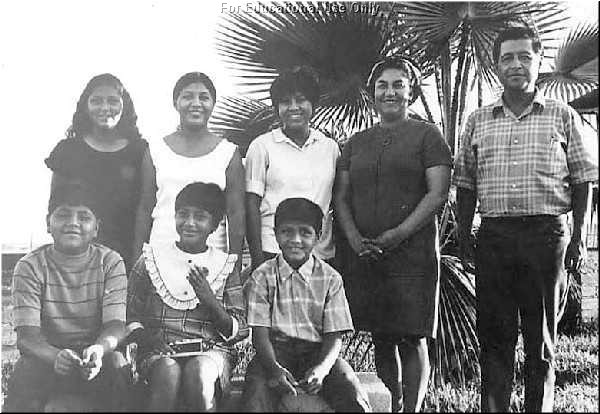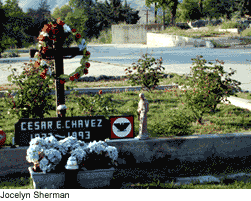
Biography
Cesar Chavez was born on March 31, 1927 in Yuma , Arizona . Cesar was the second of six children. His parents were Librado and Juana Chavez. The Chavez family owned a small farm in the San Luis Valley near the town of Yuma.(1) In August 1938 Cesar's life changed dramatically when the Chavez family began life as migrant workers in the agricultural fields of California . A year earlier the state of Arizona had taken possession of their family farm near Yuma due to the Great Depression. This began the Chavez family life as permanent migrants(2). Life became more difficult for Cesar and his family. The Chavez family, with 40,000 other migrant workers, were forced to do hard labor in the fields. The families had to rent small inadequate and run down shacks to live in while they worked. There were so many migrant workers looking for work that they would work for very small wages and in horrible conditions. They were often surrounded by dangerous pesticides, had no clean water to drink and no bathrooms to use. The migrant workers did not have any choice. An average day for a migrant worker was 3am to sunset, most days without food (3).
Following the crops up and down the state in search of work for poverty wages was not conducive to formal education. Cesar and his siblings attended thirty-seven different schools. Cesar was only able to achieve an eighth grade education in his years in schooling. He had to drop out of school when his father was in a car accident. He needed to work in the fields with his family to bring in wages. (4) Throughout his education, Cesar and his siblings were punished for speaking Spanish. One of his teachers made Cesar wear a sign that said “I'm a clown I speak Spanish.” (5) Despite the school's punishment of Spanish-speaking students, the Chavez children still felt part of the community. However, they soon began to experience racial tension and segregation once white Southerners came to Yuma for the Imperial Dam project on the Colorado River . This was only the start of the discrimination he would encounter being a Mexican American. This further fueled his flame to fight for equality and against the injustices toward farm workers(6).
Throughout his youth and into his adulthood, Cesar migrated across the southwest, laboring in the fields and vineyards, where he was exposed to the hardships and injustices of farm worker life. These experiences helped develop his vision for equality and justice for migrant and farm workers. Cesar joined the navy in 1944 and served in the Western Pacific during the aftermath of World War II. When he returned from serving, he married Helen Fabela who he met working in the vineyards in California. The Chavez family settled in the eastern part of San Jose where they had eight children(7).
Cesar, Helen and six of their kids

Cesar began his life as a community organizer in 1952. He was recruited by Fred Ross to join the Community Service Organization (CSO) which was a prominent Latino civil rights group. Cesar's involvement included organizing voter registration and conducting protests for discrimination. He became the director of the organization from the early 1950s to the 1960s. He then continued his work as a community leader in 1962 when he created the National Farm Worker's Association which later became the United Farm Workers of America (UFW) (8). He was the president of the NFWA and worked side by side with Doleres Huerta and Gilbert Padilla, the vice presidents and and Antonio Orendain, secretary-treasurer(9). His involvement with the UFW lead to the many accomplishments and breakthroughs he has made for farm laborers.

Cesar made a tremendous impact as a humanitarian and communicator who influenced many Americans to fight against social injustices and seek civil rights. His work left a significant impression on the lives of the poor and disenfranchised. He stood out as a leading voice for migrant workers. His actions brought to light the terrible working conditions of laborers where he was able to bring about improvements. César's moral vision was achieved through his belief in nonviolent actions such as protests and fasts. These proved to be effective measures as seen through his many accomplishments.
Cesar Chavez died on April 23, 1993 in San Luis , Arizona just a short distance from his birthplace in Yuma . There were over 30,000 people that attended his funeral in the small town of Delano , California where he first planted the seeds of social justice. They followed behind his simple pine casket, a symbol of his humility. Cardinal Roger M. Mahoney, the priest who gave the funeral mass, said that Chavez was "a special prophet for the worlds' farm workers." (10) He will be remembered through his motto “si, se puede” or “it can be done.” This motto symbolizes his motivation for his work and the important legacy he left in the world (11).
.